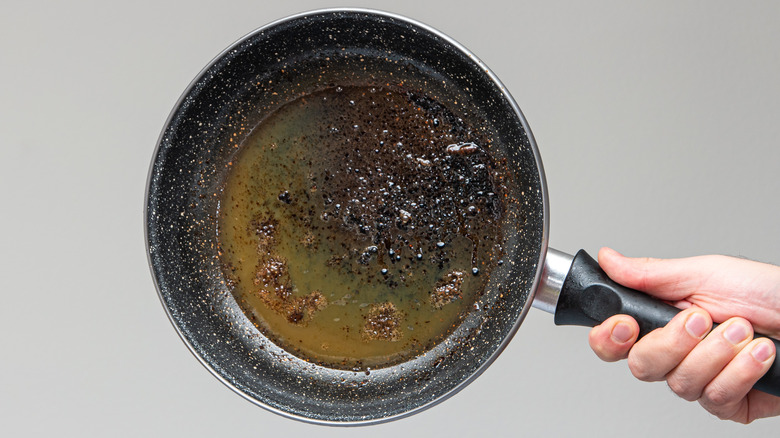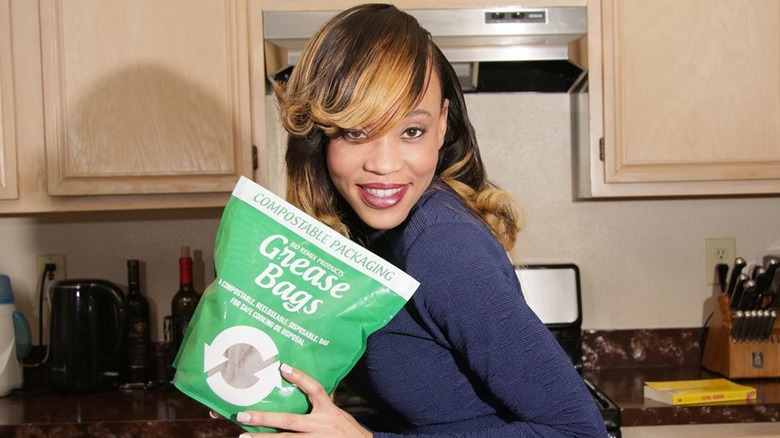Where Is Grease Bags From Shark Tank Today?
We may receive a commission on purchases made from links.
LaTangela Newsome created Grease Bags to address the problem of how best to dispose of cooking oil and kitchen grease. The answer? Proprietarily compostable, absorbent, and resealable bags that encapsulate cooking grease. Newsome brought Grease Bags to "Shark Tank" Season 8, Episode 13 before she started selling them. The entrepreneur was still in the process of getting a patent for the technology and was looking for a deal: $75,000 for 25% of the company.
Lori Greiner, Mark Cuban, Robert Herjavec, and Kevin O'Leary all passed due to variations on low confidence in the grease disposal bags. Yet, Barbara Corcoran offered a counter deal: $75,000 for 50% of the company, contingent on Newsome lowering the retail price from $12.99 to $6.99. Newsome took the deal, but she later told Cosmopolitan it eventually fell through, and Grease Bags had some trouble right out the gate with fulfilling orders.
Appearing on "Shark Tank" often means a boost in sales even without a deal. However, without deliverable products, the company stood to lose out on that big bump. So, Newsome paid out of pocket to produce Grease Bags but still did not get the post-"Shark Tank" orders out on time.
Clogged progress for Grease Bags
The misstep with Grease Bags' first shipment after "Shark Tank" cost it some credibility with customers, but the company eventually managed to get those orders out. Now, Grease Bags are available to purchase on both Amazon and the brand's Shopify store for $13.99. However, the brand's Amazon reviews prove to be less than stellar, with many customers complaining about the durability of the product, leading to a lackluster 3.4 out of 5 stars. Although folks seem to think the product is great when it actually works, many reviews mention structural issues with the bags, leading to leaking oil and unsightly mess.
Similar garbage disposal bags on Amazon seem to fare better. Toss-It! brand bags, for example, are arguably not quite as environmentally conscious as Grease Bags. However, they're available at about $9.99 per six-pack and they have a more favorable 4-out-of-5 star rating (with over three times the number of reviews).
Grease Bags apparently partnered with the city of Atlanta back in January 2020 for an undisclosed order size, per an announcement on its Facebook. The company's Facebook page also promised a relaunch of new and "even greener" bags in the summer of 2022, however, the company stopped posting as of August of that year and some recent comments about whether or not it's still in business remain unanswered (in fact, even its Amazon cache seems to be almost out of stock). It's worth noting though, that the brand's Instagram was active as of July 2023, but no posts have been made since.
Disposing of cooking oil, fat, and grease
Disposing of grease properly is an important part of cooking, and we're not talking about pouring it onto train tracks — the unconventional spot Martha Stewart once dumped cooking grease. There are multiple reasons you don't want to pour deep-frying oil or bacon grease down your sink drains. It can solidify and clog them, causing major backups in your pipes and public sewer systems.
Beyond that, cooking grease has negative environmental effects similar to petroleum oils. Spills of cooking oil can afflict animals and plants, causing hypothermia and other issues in terrestrial life, while potentially suffocating aquatic life through oxygen depletion. This can also contaminate the environment itself, create toxicity, and potentially catch fire.
Small amounts of oil — about one cup – can be composted at home. For the rest, you're best off getting rid of it, like in the clever way Rachael Ray gets rid of frying oil. Your local waste management site may also have oil-disposal services available, but when in doubt, a sealed container in the trash works.


